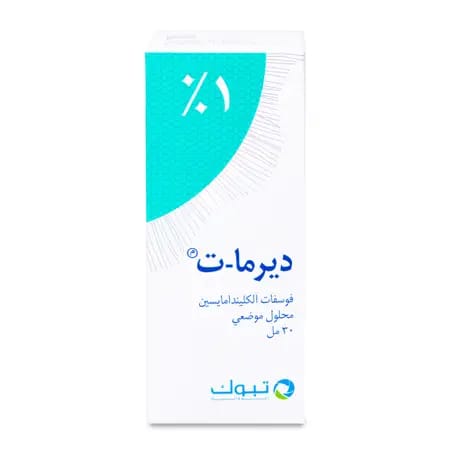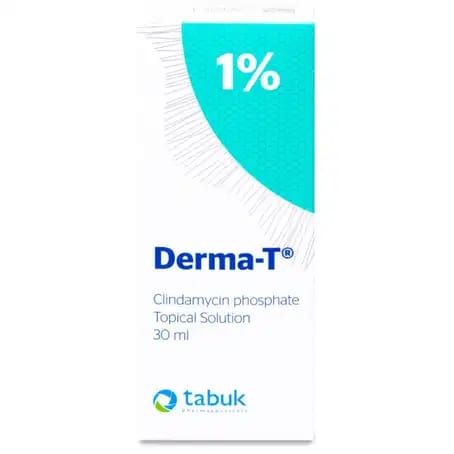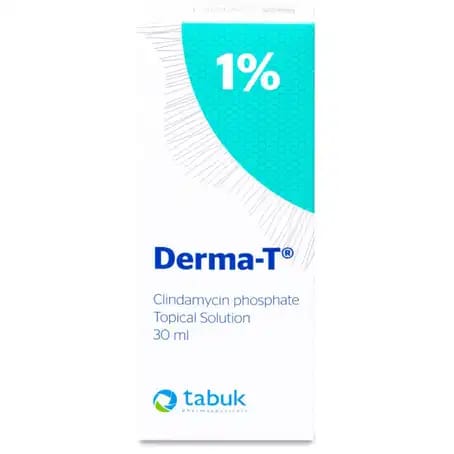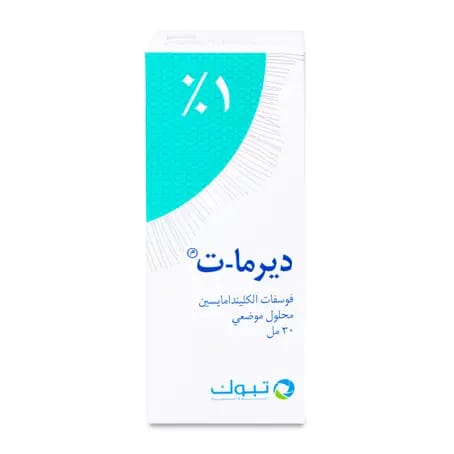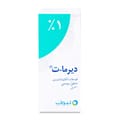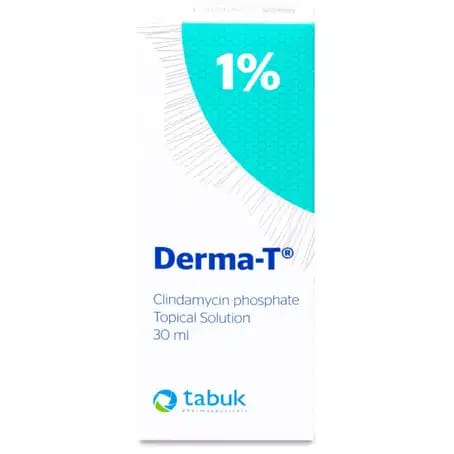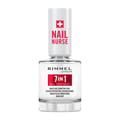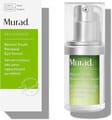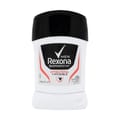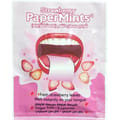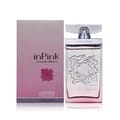One Square - Ar Rabi, 7773, 13315 Riyadh SA
Whites
One Square - Ar Rabi, 7773, Riyadh, SA
+966920006648 https://store.whites.net/s/5e5b8eb5e1a30016118f588f/62495a1e58355cabd8278173/app-icon-1024x1024px-480x480.png" [email protected] 5e9d4c523bd21337b48d4958 Derma-T Topical Solution 30 ml https://store.whites.net/s/5e5b8eb5e1a30016118f588f/63c3e63e1dcb1008c7e977af/26334.jpg
Clindamycin hydrochloride Sterile Solution*
What Clindamycin hydrochloride is used for:
It is an antibiotic used in the treatment of serious bacterial infections.
Do not use Clindamycin hydrochloride:
If you are allergic (hypersensitive) to clindamycin, lincomycin or to any of the other ingredients in this medicine.
Warnings and precautions:
Talk to your doctor or pharmacist before using clindamycin if:
• you have diarrhea or usually get diarrhea when you take antibiotics or have ever suffered from problems with your stomach or intestines. If you develop severe or prolonged or bloody diarrhea during or after using Clindamycin tell your doctor immediately since it may be necessary to interrupt the treatment. This may be a sign of bowel inflammation (pseudomembranous colitis) which can occur following treatment with antibiotics
• you suffer from problems with your kidneys or liver
• you suffer from asthma, eczema or hay fever
• you develop any severe skin reactions or hypersensitivity to Clindamycin
Possible side effects:
Stop using the product and seek immediate medical attention if you develop throat tightness or swelling of the eyes, face, lips or tongue, feel faint, or have difficulty breathing. Stop using the product if you develop hives or itching of the face or body.
Other medicines and Clindamycin hydrochloride:
Tell your doctor or pharmacist or nurse if you are taking, have recently taken or might take any other medicines:
• muscle relaxants used for operations (neuromuscular blockers).
• oral contraceptive pills. You should use extra contraception such as condoms whilst taking Clindamycin and for seven days after taking Clindamycin.
• warfarin or similar medicines – used to thin the blood. You may be more likely to have a bleed. Your doctor may need to take regular blood tests to check how well your blood can clot.
• CYP3A4 or CYP3A5 inducers like rifampicin may impact effectiveness of the medicine.
How to use Clindamycin hydrochloride:
Adults and Elderly Patients
The recommended dose of Clindamycin is between 150 and 450mg (1 to 3 capsules) every 6 hours, depending on the severity of your infection.
Use in children
This medicine is used for children who are able to swallow capsules. The recommended dose in children is between 12 and 25 mg / kg /day of bodyweight, divided into six hourly doses, depending on the severity of the infection
How to store Clindamycin hydrochloride:
Keep this medicine out of the sight and reach of children.
Do not use Clindamycin hydrochloride capsules after the expiry date which is stated on the carton and blister labels. The expiry date refers to the last day of that month.
Store below 25°C.
Do not throw away any medicines via wastewater or household waste. Ask your pharmacist how to throw away medicines you no longer use. These measures will help to protect the environment.
* Dosage form and route of administration of clindamycin 300 mg capsules, clindamycin 75 mg capsules, clindamycin Sterile Solution, clindamycin 2% Cream, clindamycin Topical Lotion, should be prescribed according to therapeutic indication and disease severity of each individual patient.
26334in stockSAR 22.15
DERMA T
Email ID already exists!
Your Current password is incorrect
Password Updated Successfully
Thanks for your Feedback
- Home
- Medications
- Medication
- Derma-T Topical Solution 30 ml
Derma-T Topical Solution 30 ml
 22.15
22.15Inclusive VAT
Loyalty Program
Loyalty
For each qualifying purchase you make, you will accumulate loyalty points. These points can then be redeemed for a variety of rewards such as discounts, exclusive, offers or even free products.
For Each
100
SAR
-->
100
POINTS
TIER2
100
SPAR SPEND
=
100
POINTS
TIER3
100
SPAR SPEND
=
100
POINTS
This Product is only deliverable in Riyadh
- Details Clindamycin hydrochloride Sterile Solution*What Clindamycin hydrochloride is used for:It is an antibiotic used in the treatment of serious bacterial infections.Do not use Clindamycin hydrochloride:If you are allergic (hypersensitive) to clindamycin, lincomycin or to any of the other ingredients in this medicine.Warnings and precautions:Talk to your doctor or pharmacist before using clindamycin if:• you have diarrhea or usually get diarrhea when you take antibiotics or have ever suffered from problems with your stomach or intestines. If you develop severe or prolonged or bloody diarrhea during or after using Clindamycin tell your doctor immediately since it may be necessary to interrupt the treatment. This may be a sign of bowel inflammation (pseudomembranous colitis) which can occur following treatment with antibiotics• you suffer from problems with your kidneys or liver• you suffer from asthma, eczema or hay fever• you develop any severe skin reactions or hypersensitivity to ClindamycinPossible side effects:Stop using the product and seek immediate medical attention if you develop throat tightness or swelling of the eyes, face, lips or tongue, feel faint, or have difficulty breathing. Stop using the product if you develop hives or itching of the face or body.Other medicines and Clindamycin hydrochloride:Tell your doctor or pharmacist or nurse if you are taking, have recently taken or might take any other medicines:• muscle relaxants used for operations (neuromuscular blockers).• oral contraceptive pills. You should use extra contraception such as condoms whilst taking Clindamycin and for seven days after taking Clindamycin.• warfarin or similar medicines – used to thin the blood. You may be more likely to have a bleed. Your doctor may need to take regular blood tests to check how well your blood can clot.• CYP3A4 or CYP3A5 inducers like rifampicin may impact effectiveness of the medicine.How to use Clindamycin hydrochloride:Adults and Elderly PatientsThe recommended dose of Clindamycin is between 150 and 450mg (1 to 3 capsules) every 6 hours, depending on the severity of your infection.Use in childrenThis medicine is used for children who are able to swallow capsules. The recommended dose in children is between 12 and 25 mg / kg /day of bodyweight, divided into six hourly doses, depending on the severity of the infectionHow to store Clindamycin hydrochloride:Keep this medicine out of the sight and reach of children.Do not use Clindamycin hydrochloride capsules after the expiry date which is stated on the carton and blister labels. The expiry date refers to the last day of that month.Store below 25°C.Do not throw away any medicines via wastewater or household waste. Ask your pharmacist how to throw away medicines you no longer use. These measures will help to protect the environment.* Dosage form and route of administration of clindamycin 300 mg capsules, clindamycin 75 mg capsules, clindamycin Sterile Solution, clindamycin 2% Cream, clindamycin Topical Lotion, should be prescribed according to therapeutic indication and disease severity of each individual patient.
Clindamycin hydrochloride Sterile Solution*
What Clindamycin hydrochloride is used for:
It is an antibiotic used in the treatment of serious bacterial infections.
Do not use Clindamycin hydrochloride:
If you are allergic (hypersensitive) to clindamycin, lincomycin or to any of the other ingredients in this medicine.
Warnings and precautions:
Talk to your doctor or pharmacist before using clindamycin if:
• you have diarrhea or usually get diarrhea when you take antibiotics or have ever suffered from problems with your stomach or intestines. If you develop severe or prolonged or bloody diarrhea during or after using Clindamycin tell your doctor immediately since it may be necessary to interrupt the treatment. This may be a sign of bowel inflammation (pseudomembranous colitis) which can occur following treatment with antibiotics
• you suffer from problems with your kidneys or liver
• you suffer from asthma, eczema or hay fever
• you develop any severe skin reactions or hypersensitivity to Clindamycin
Possible side effects:
Stop using the product and seek immediate medical attention if you develop throat tightness or swelling of the eyes, face, lips or tongue, feel faint, or have difficulty breathing. Stop using the product if you develop hives or itching of the face or body.
Other medicines and Clindamycin hydrochloride:
Tell your doctor or pharmacist or nurse if you are taking, have recently taken or might take any other medicines:
• muscle relaxants used for operations (neuromuscular blockers).
• oral contraceptive pills. You should use extra contraception such as condoms whilst taking Clindamycin and for seven days after taking Clindamycin.
• warfarin or similar medicines – used to thin the blood. You may be more likely to have a bleed. Your doctor may need to take regular blood tests to check how well your blood can clot.
• CYP3A4 or CYP3A5 inducers like rifampicin may impact effectiveness of the medicine.
How to use Clindamycin hydrochloride:
Adults and Elderly Patients
The recommended dose of Clindamycin is between 150 and 450mg (1 to 3 capsules) every 6 hours, depending on the severity of your infection.
Use in children
This medicine is used for children who are able to swallow capsules. The recommended dose in children is between 12 and 25 mg / kg /day of bodyweight, divided into six hourly doses, depending on the severity of the infection
How to store Clindamycin hydrochloride:
Keep this medicine out of the sight and reach of children.
Do not use Clindamycin hydrochloride capsules after the expiry date which is stated on the carton and blister labels. The expiry date refers to the last day of that month.
Store below 25°C.
Do not throw away any medicines via wastewater or household waste. Ask your pharmacist how to throw away medicines you no longer use. These measures will help to protect the environment.
* Dosage form and route of administration of clindamycin 300 mg capsules, clindamycin 75 mg capsules, clindamycin Sterile Solution, clindamycin 2% Cream, clindamycin Topical Lotion, should be prescribed according to therapeutic indication and disease severity of each individual patient.
Clindamycin hydrochloride Sterile Solution*
What Clindamycin hydrochloride is used for:
It is an antibiotic used in the treatment of serious bacterial infections.
Do not use Clindamycin hydrochloride:
If you are allergic (hypersensitive) to clindamycin, lincomycin or to any of the other ingredients in this medicine.
Warnings and precautions:
Talk to your doctor or pharmacist before using clindamycin if:
• you have diarrhea or usually get diarrhea when you take antibiotics or have ever suffered from problems with your stomach or intestines. If you develop severe or prolonged or bloody diarrhea during or after using Clindamycin tell your doctor immediately since it may be necessary to interrupt the treatment. This may be a sign of bowel inflammation (pseudomembranous colitis) which can occur following treatment with antibiotics
• you suffer from problems with your kidneys or liver
• you suffer from asthma, eczema or hay fever
• you develop any severe skin reactions or hypersensitivity to Clindamycin
Possible side effects:
Stop using the product and seek immediate medical attention if you develop throat tightness or swelling of the eyes, face, lips or tongue, feel faint, or have difficulty breathing. Stop using the product if you develop hives or itching of the face or body.
Other medicines and Clindamycin hydrochloride:
Tell your doctor or pharmacist or nurse if you are taking, have recently taken or might take any other medicines:
• muscle relaxants used for operations (neuromuscular blockers).
• oral contraceptive pills. You should use extra contraception such as condoms whilst taking Clindamycin and for seven days after taking Clindamycin.
• warfarin or similar medicines – used to thin the blood. You may be more likely to have a bleed. Your doctor may need to take regular blood tests to check how well your blood can clot.
• CYP3A4 or CYP3A5 inducers like rifampicin may impact effectiveness of the medicine.
How to use Clindamycin hydrochloride:
Adults and Elderly Patients
The recommended dose of Clindamycin is between 150 and 450mg (1 to 3 capsules) every 6 hours, depending on the severity of your infection.
Use in children
This medicine is used for children who are able to swallow capsules. The recommended dose in children is between 12 and 25 mg / kg /day of bodyweight, divided into six hourly doses, depending on the severity of the infection
How to store Clindamycin hydrochloride:
Keep this medicine out of the sight and reach of children.
Do not use Clindamycin hydrochloride capsules after the expiry date which is stated on the carton and blister labels. The expiry date refers to the last day of that month.
Store below 25°C.
Do not throw away any medicines via wastewater or household waste. Ask your pharmacist how to throw away medicines you no longer use. These measures will help to protect the environment.
* Dosage form and route of administration of clindamycin 300 mg capsules, clindamycin 75 mg capsules, clindamycin Sterile Solution, clindamycin 2% Cream, clindamycin Topical Lotion, should be prescribed according to therapeutic indication and disease severity of each individual patient.
Clindamycin hydrochloride Sterile Solution*
What Clindamycin hydrochloride is used for:
It is an antibiotic used in the treatment of serious bacterial infections.
Do not use Clindamycin hydrochloride:
If you are allergic (hypersensitive) to clindamycin, lincomycin or to any of the other ingredients in this medicine.
Warnings and precautions:
Talk to your doctor or pharmacist before using clindamycin if:
• you have diarrhea or usually get diarrhea when you take antibiotics or have ever suffered from problems with your stomach or intestines. If you develop severe or prolonged or bloody diarrhea during or after using Clindamycin tell your doctor immediately since it may be necessary to interrupt the treatment. This may be a sign of bowel inflammation (pseudomembranous colitis) which can occur following treatment with antibiotics
• you suffer from problems with your kidneys or liver
• you suffer from asthma, eczema or hay fever
• you develop any severe skin reactions or hypersensitivity to Clindamycin
Possible side effects:
Stop using the product and seek immediate medical attention if you develop throat tightness or swelling of the eyes, face, lips or tongue, feel faint, or have difficulty breathing. Stop using the product if you develop hives or itching of the face or body.
Other medicines and Clindamycin hydrochloride:
Tell your doctor or pharmacist or nurse if you are taking, have recently taken or might take any other medicines:
• muscle relaxants used for operations (neuromuscular blockers).
• oral contraceptive pills. You should use extra contraception such as condoms whilst taking Clindamycin and for seven days after taking Clindamycin.
• warfarin or similar medicines – used to thin the blood. You may be more likely to have a bleed. Your doctor may need to take regular blood tests to check how well your blood can clot.
• CYP3A4 or CYP3A5 inducers like rifampicin may impact effectiveness of the medicine.
How to use Clindamycin hydrochloride:
Adults and Elderly Patients
The recommended dose of Clindamycin is between 150 and 450mg (1 to 3 capsules) every 6 hours, depending on the severity of your infection.
Use in children
This medicine is used for children who are able to swallow capsules. The recommended dose in children is between 12 and 25 mg / kg /day of bodyweight, divided into six hourly doses, depending on the severity of the infection
How to store Clindamycin hydrochloride:
Keep this medicine out of the sight and reach of children.
Do not use Clindamycin hydrochloride capsules after the expiry date which is stated on the carton and blister labels. The expiry date refers to the last day of that month.
Store below 25°C.
Do not throw away any medicines via wastewater or household waste. Ask your pharmacist how to throw away medicines you no longer use. These measures will help to protect the environment.
* Dosage form and route of administration of clindamycin 300 mg capsules, clindamycin 75 mg capsules, clindamycin Sterile Solution, clindamycin 2% Cream, clindamycin Topical Lotion, should be prescribed according to therapeutic indication and disease severity of each individual patient.

